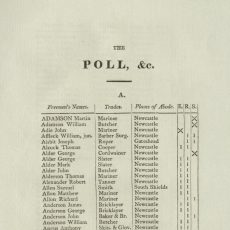Mar
1768
minehead
Contested
GENERAL ELECTION
In the general election of Mar 1768, 343 people voted. There were 3 candidates, with Charles Whitworth & Henry Fownes Luttrell elected.
Poll book data from:
Holding: Somerset Heritage Centre
Citation: DD/L/1/59/8/7
Source: Information provided by Dr Edmund M. Green.
Timeline & Key Statistics
Contexts & Remarks
- Date: Friday 18 Mar. 1768.
- Poll book reference: Somerset Heritage Centre, DD/L/1/59/8/9.
- In 1768, three candidates progressed to the poll in 1768: Henry Fownes Luttrell and Charles Whitworth were returned ahead of Henry Shiffner. Following the death of his wife in 1766, Luttrell told his ally and agent, Rev. Leonard Herring, that 'the late severe Loss I have sustained, has made Home become very dull and insipid to me, and therefore I have some Thoughts of Changing the Scene, & going into Parliam[en]t' (Somerset Heritage Centre, DD/L/1/59/7/2a). He informed Shiffner that he would no longer support his candidature as the sharing of his interest 'may prove fatal to [us] both' -- but Shiffner was determined to stand regardless.
- During canvassing, Whitworth promised to stand with 'an Eminent merchant' from London who never materialised, while promising education for poor voters' children along with ten guineas per voter (DD/L/1/59/7/5; DD/L/1/59/7/7a). Meanwhile, Luttrell distributed more than £980 at five guineas per vote. (DD/L/1/59/7/18). In total, he spent more than £1,800 on food, drink, ribbons (including those 'given the Maids', 'for the Chair', and 'for the Horses brides'), constables, chairmen, drummers, fiddlers, and money 'to distribute among the poor' (DD/L/1/59/8/1a). To some extent, these expenses may have been shaped by some of the comments made by electors during canvassing, which included 'hopes [Luttrell] will remember the poor voters' and William Webber's comment that he would vote for 'Whoever gives most money' (DD/L/1/59/8/3). Luttrell further cemented his interest by travelling to London and convincing the government to award all Minehead offices at Luttrell's recommendation, so that the borough was, as Lord North later put it, 'intirely in your hands' (DD/L/1/59/10/14).
- Luttrell asked his allies in Minehead to conduct multiple canvasses on his behalf. In March 1767, Herring reported that 'we made a most noble Appearance, having almost every Man in Town of any Consequence to attend us excepting some few, th[a]t were ill' (DD/L/1/59/7/7c). No fewer than five canvass lists were compiled between 1767 and 1768, plus a further three which doubled as poll books ? including information ranging from remarks and observations, to which voters received gifts, to who had promised their vote.
- The poll book transcribed here, which forms part of the Luttrell family papers, includes 'Remarks before the Poll' and 'Queries and Remarks at the Poll' about many voters, largely regarding their status as housekeepers or parishioners, but also more personal commentary (e.g. 'a quibling fellow' and 'Saucey'). The poll also indicates the 'promised' votes of each elector and marks some as 'absent' at the time of election.
Poll Book
Below is a digitised version of the poll book for this election:



